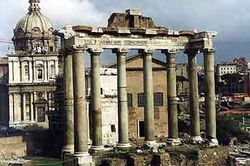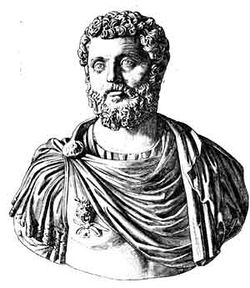Template:Life and Death
Life and Death

The conflict between Christians and the people who persecuted them in the early days of the Church was mostly over their system of social welfare which was managed through their temples like Ephesus, Temple of Saturn and the Parthenon. The Christians depended on a Holy temple made of living stones which was a network of people living by the perfect law of liberty and faith, hope and charity. Those that had shared with those who had true needs.
Our modern ideas of religion differ from the meaning of the word in the days the Bible was written. Pure religion was a religion rooted in charity alone and not defiled by the force and abuses of the world.
Celsus, a Platonist, writing during the term of Marcus Aurelius, “opposed the ‘sectarian’ tendencies at work in the Christian movement because he saw in Christianity a ‘privatizing’ of religion, the transferal of religious values from the public sphere to a private association.” [1]
Celsus' writings no longer survive in tact, but we have access to some of his work when Origen quotes passages for the purpose of refuting what he claimed. The following is one of those quoted passages.
- "Jesus had come from a village in Judea, and was the son of a poor Jewess who gained her living by the work of her own hands. His mother had been turned out of doors by her husband, who was a carpenter by trade, on being convicted of adultery [with a soldier named Panthéra (i.32)]. Being thus driven away by her husband, and wandering about in disgrace, she gave birth to Jesus, a bastard. Jesus, on account of his poverty, was hired out to go to Egypt. While there he acquired certain (magical) powers which Egyptians pride themselves on possessing. He returned home highly elated at possessing these powers, and on the strength of them gave himself out to be a god." Origen, Contra Celsum 1.28 Translation
The difference between public and private welfare is the difference between socialism and charity. The nation of Rome and those of the Pax Romana were all going socialist and made the power of the state their benefactors while Christians were living by love for one another in the "union and discipline" of companies of tens according to the commandments of Christ.

This persecution which began under the Emperor Septimius Severus:
- "Severus returned victorious from having vanquished the kings who had taken part with Nigar against him, he published his cruel edicts against the Christians in the year of Christ 202, the tenth of his reign. But the general laws of the empire against foreign religions, and the former edicts of several emperors against the Christians, were a sufficient warrant to many governors to draw the sword against them before that time; and we find that the persecution was very hot in Africa two years before, under the proconsul Saturninus..." [2]
The emperors maintained the loyalty by the sword and by the temples which supplied free bread and welfare for the people in a welfare state. A welfare state is a "concept of government in which the state plays a key role in the protection and promotion of the economic and social well-being of its citizens. It is based on the principles of equality of opportunity, equitable distribution of wealth, and public responsibility for those unable to avail themselves of the minimal provisions for a good life. The general term may cover a variety of forms of economic and social organization." Welfare state, Britannica Online Encyclopedia
The Church is one form of government that depends upon charity rather than force. As Christians, the six principal among them were Speratus, Marsalis, and Cittinus; and three women, Donata, Secunda, and Vestina, declined the proconsul's offer to them of the emperor’s pardon if they would worship the gods of the Romans, and sign up for their system of Qorban, social welfare. They knew that system of sacrifice made the word of God to none effect. Christians relied upon the Genius of God the Father working through the freewill offerings given in congregations of the Church by faith, hope, and charity.
Vigellius Saturninus, proconsul of Africa in 180 CE, addressed the seeming antisocial behavior of the twelve Scillitan Christian martyrs with the statement, “We too are religious, and our religion is simple, and we swear by the Genius of our lord the emperor, and we apply for his benefits, as you also ought to do.” The true Christians like Speratus, one of the twelve, would not apply to that Emperor for their daily bread and social security or common welfare, but claimed Christ as “Lord, the King of kings” and ruler of all nations saying:
- "I know not the genius of the emperor of this world; but I serve the God of heaven, whom no mortal man hath ever seen or can see. I never committed any crime punishable by the laws of the state. I pay the public duties for whatever I buy, acknowledging the emperor for my temporal lord; but I adore none but my God, who is the King of kings, and sovereign Lord over all the nations of the world. I have been guilty of no crime, and therefore cannot have incurred punishment."
Most modern Christians are not following in the way of Christ and his system of social welfare by charity alone but have been seeking the system that early Christians died to avoid. The result is that modern society has become fit subjects for tyrants and despots. They have not only weakened the poor but themselves.
Christians should turn around, Repent, and begin to seek the ways of Christ and the prophets by forming charitable systems based not on force but on the love of Christ.